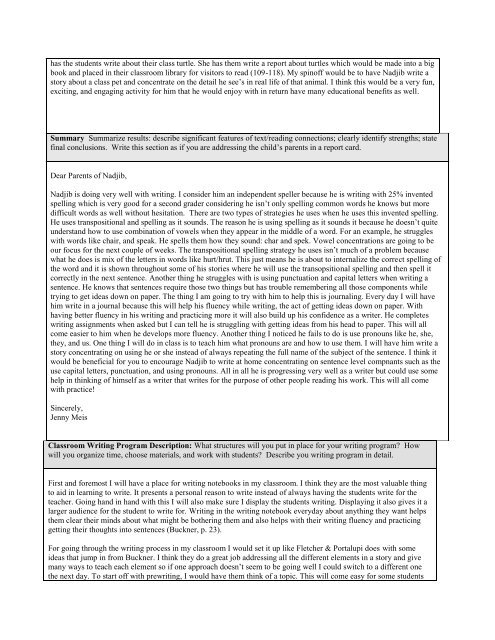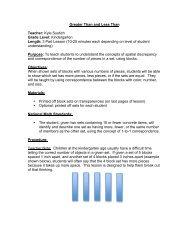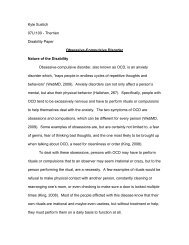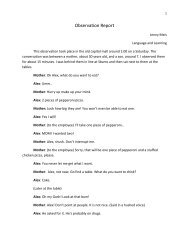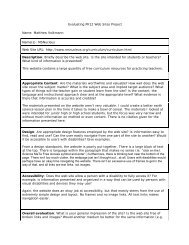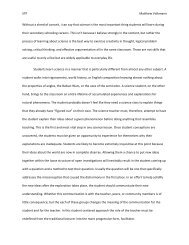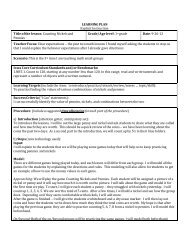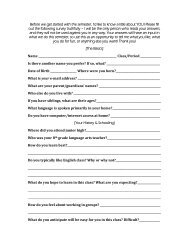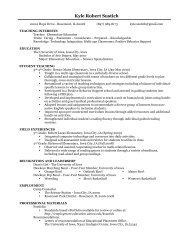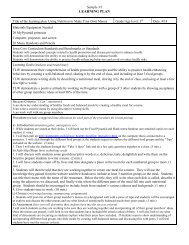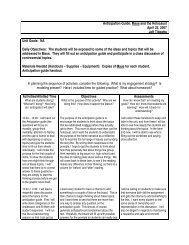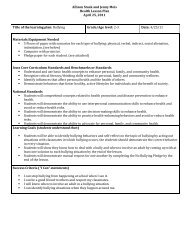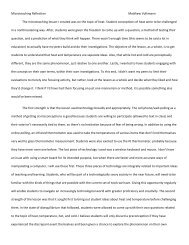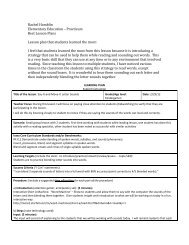Writing child study - Employment
Writing child study - Employment
Writing child study - Employment
Create successful ePaper yourself
Turn your PDF publications into a flip-book with our unique Google optimized e-Paper software.
has the students write about their class turtle. She has them write a report about turtles which would be made into a big<br />
book and placed in their classroom library for visitors to read (109-118). My spinoff would be to have Nadjib write a<br />
story about a class pet and concentrate on the detail he see’s in real life of that animal. I think this would be a very fun,<br />
exciting, and engaging activity for him that he would enjoy with in return have many educational benefits as well.<br />
Summary Summarize results: describe significant features of text/reading connections; clearly identify strengths; state<br />
final conclusions. Write this section as if you are addressing the <strong>child</strong>’s parents in a report card.<br />
Dear Parents of Nadjib,<br />
Nadjib is doing very well with writing. I consider him an independent speller because he is writing with 25% invented<br />
spelling which is very good for a second grader considering he isn’t only spelling common words he knows but more<br />
difficult words as well without hesitation. There are two types of strategies he uses when he uses this invented spelling.<br />
He uses transpositional and spelling as it sounds. The reason he is using spelling as it sounds it because he doesn’t quite<br />
understand how to use combination of vowels when they appear in the middle of a word. For an example, he struggles<br />
with words like chair, and speak. He spells them how they sound: char and spek. Vowel concentrations are going to be<br />
our focus for the next couple of weeks. The transpositional spelling strategy he uses isn’t much of a problem because<br />
what he does is mix of the letters in words like hurt/hrut. This just means he is about to internalize the correct spelling of<br />
the word and it is shown throughout some of his stories where he will use the transopsitional spelling and then spell it<br />
correctly in the next sentence. Another thing he struggles with is using punctuation and capital letters when writing a<br />
sentence. He knows that sentences require those two things but has trouble remembering all those components while<br />
trying to get ideas down on paper. The thing I am going to try with him to help this is journaling. Every day I will have<br />
him write in a journal because this will help his fluency while writing, the act of getting ideas down on paper. With<br />
having better fluency in his writing and practicing more it will also build up his confidence as a writer. He completes<br />
writing assignments when asked but I can tell he is struggling with getting ideas from his head to paper. This will all<br />
come easier to him when he develops more fluency. Another thing I noticed he fails to do is use pronouns like he, she,<br />
they, and us. One thing I will do in class is to teach him what pronouns are and how to use them. I will have him write a<br />
story concentrating on using he or she instead of always repeating the full name of the subject of the sentence. I think it<br />
would be beneficial for you to encourage Nadjib to write at home concentrating on sentence level compnants such as the<br />
use capital letters, punctuation, and using pronouns. All in all he is progressing very well as a writer but could use some<br />
help in thinking of himself as a writer that writes for the purpose of other people reading his work. This will all come<br />
with practice!<br />
Sincerely,<br />
Jenny Meis<br />
Classroom <strong>Writing</strong> Program Description: What structures will you put in place for your writing program? How<br />
will you organize time, choose materials, and work with students? Describe you writing program in detail.<br />
First and foremost I will have a place for writing notebooks in my classroom. I think they are the most valuable thing<br />
to aid in learning to write. It presents a personal reason to write instead of always having the students write for the<br />
teacher. Going hand in hand with this I will also make sure I display the students writing. Displaying it also gives it a<br />
larger audience for the student to write for. <strong>Writing</strong> in the writing notebook everyday about anything they want helps<br />
them clear their minds about what might be bothering them and also helps with their writing fluency and practicing<br />
getting their thoughts into sentences (Buckner, p. 23).<br />
For going through the writing process in my classroom I would set it up like Fletcher & Portalupi does with some<br />
ideas that jump in from Buckner. I think they do a great job addressing all the different elements in a story and give<br />
many ways to teach each element so if one approach doesn’t seem to be going well I could switch to a different one<br />
the next day. To start off with prewriting, I would have them think of a topic. This will come easy for some students


